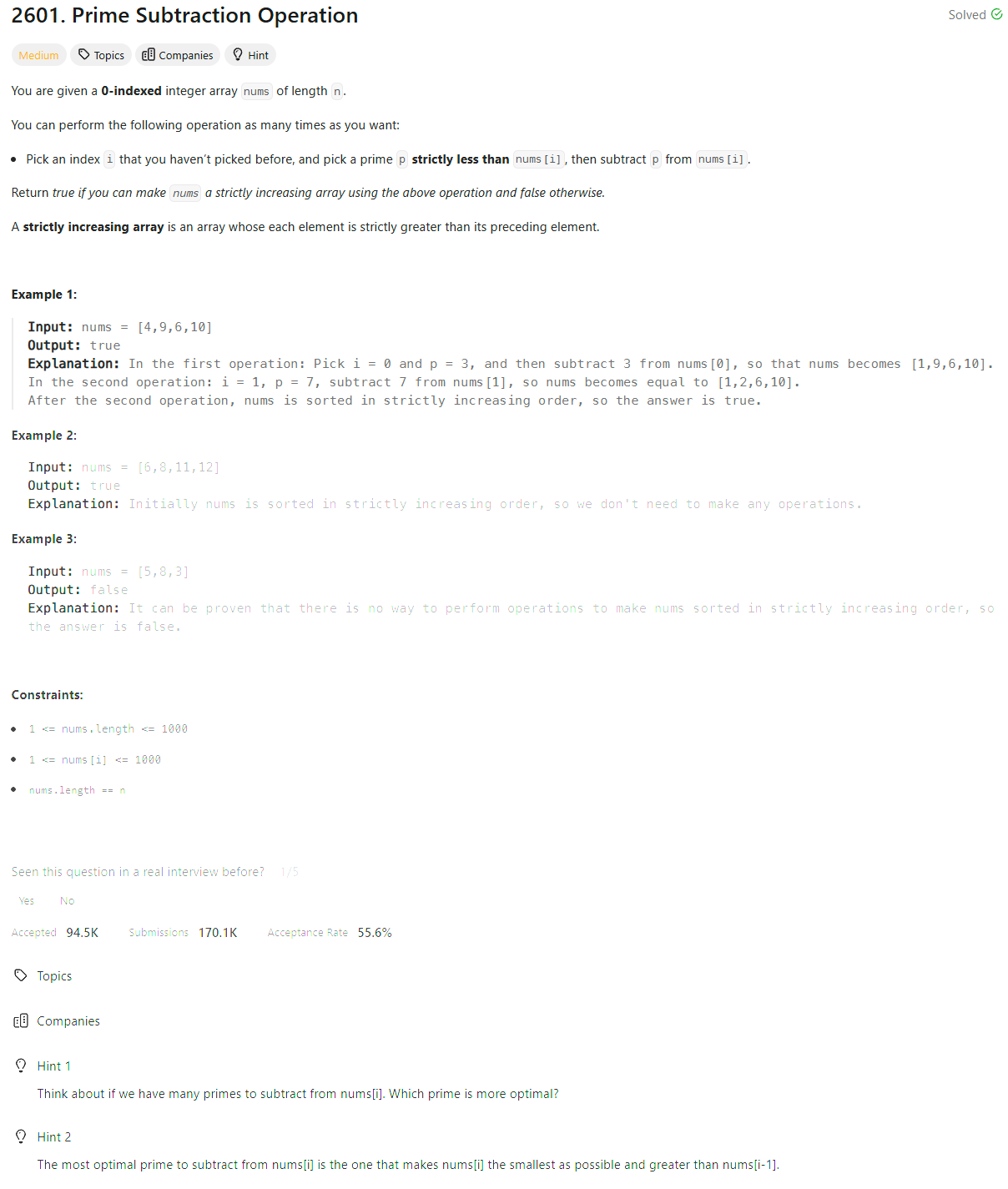Problem of The Day: Prime Subtraction Operation
Problem Statement

Intuition
The problem requires modifying the elements in a list so that they form a strictly increasing sequence by subtracting prime numbers from each element. My initial intuition was to attempt a greedy approach. For each element, I could try to find the largest possible prime number to subtract, ensuring each element is less than the previous, thereby maintaining a strictly increasing order.
Approach
- Copy the input list
numsinto a new listarr, where each element will be adjusted. - For each element in
nums, find the largest prime number that can be subtracted to makearr[i]less thanarr[i-1](the previous element inarr).- Start with the largest possible candidate (
num - 1) and decrement until finding a valid prime.
- Start with the largest possible candidate (
- Update
arr[i]after finding the prime that allowsarrto remain strictly increasing up to that point. - After processing all elements, check if
arris strictly increasing. If so, returnTrue; otherwise, returnFalse.
Helper Functions
isPrime(n): Checks ifnis prime by verifying that no numbers between 2 andn-1dividen.isStrictlyIncreaseOrder(nums): Ensures that the listnumsis strictly increasing by comparing each element to the next.
Complexity
-
Time Complexity:
- Prime-checking function: (O(\sqrt{n})) for each check, repeated for each element in
nums, so overall complexity depends on the size of primes tested. - Strictly increasing check: (O(n)).
- Prime-checking function: (O(\sqrt{n})) for each check, repeated for each element in
-
Space Complexity:
- (O(n)) to store the modified array
arr.
- (O(n)) to store the modified array
Code
class Solution:
def primeSubOperation(self, nums: List[int]) -> bool:
arr = nums[:]
for i, num in enumerate(nums):
curr = num - 1
if i == 0:
while curr >= 0 and not self.isPrime(curr):
curr -= 1
else:
while 0 < num - curr <= arr[i - 1] or not self.isPrime(curr):
curr -= 1
if curr > 0:
arr[i] = num - curr
if self.isStrictlyIncreaseOrder(arr):
return True
return False
def isPrime(self, n):
if n == 0 or n == 1:
return False
for i in range(2, n):
if n % i == 0:
return False
return True
def isStrictlyIncreaseOrder(self, nums):
for i in range(len(nums) - 1):
if nums[i] >= nums[i + 1]:
return False
return True
Editorial
Approach 1: Brute Force
class Solution:
def check_prime(self, x: int) -> bool:
for i in range(2, int(x**0.5) + 1):
if x % i == 0:
return False
return True
def primeSubOperation(self, nums: List[int]) -> bool:
for i in range(len(nums)):
# In case of first index, we need to find the largest prime less than nums[0].
if i == 0:
bound = nums[0]
else:
# Otherwise, we need to find the largest prime, that makes the current element
# closest to the previous element.
bound = nums[i] - nums[i - 1]
# If the bound is less than or equal to 0, then the array cannot be made strictly increasing.
if bound <= 0:
return False
# Find the largest prime less than bound.
largest_prime = 0
for j in range(bound - 1, 1, -1):
if self.check_prime(j):
largest_prime = j
break
# Subtract this value from nums[i].
nums[i] = nums[i] - largest_prime
return True
- time: O(n * m*sqrt(m))
- space: O(1)
Approach 2: Storing the primes
class Solution:
def isprime(self, n):
for i in range(2, isqrt(n) + 1):
if n % i == 0:
return False
return True
def primeSubOperation(self, nums):
maxElement = max(nums)
# Store the previousPrime array.
previous_prime = [0] * (maxElement + 1)
for i in range(2, maxElement + 1):
if self.isprime(i):
previous_prime[i] = i
else:
previous_prime[i] = previous_prime[i - 1]
for i in range(len(nums)):
# In case of first index, we need to find the largest prime less
# than nums[0].
if i == 0:
bound = nums[0]
else:
# Otherwise, we need to find the largest prime, that makes the
# current element closest to the previous element.
bound = nums[i] - nums[i - 1]
# If the bound is less than or equal to 0, then the array cannot be
# made strictly increasing.
if bound <= 0:
return False
# Find the largest prime less than bound.
largest_prime = previous_prime[bound - 1]
# Subtract this value from nums[i].
nums[i] -= largest_prime
return True
Approach 3: Sieve of Eratosthenes + Two Pointers
class Solution:
def primeSubOperation(self, nums):
max_element = max(nums)
# Store the sieve array.
sieve = [1] * (max_element + 1)
sieve[1] = 0
for i in range(2, int(math.sqrt(max_element + 1)) + 1):
if sieve[i] == 1:
for j in range(i * i, max_element + 1, i):
sieve[j] = 0
# Start by storing the currValue as 1, and the initial index as 0.
curr_value = 1
i = 0
while i < len(nums):
# Store the difference needed to make nums[i] equal to currValue.
difference = nums[i] - curr_value
# If difference is less than 0, then nums[i] is already less than
# currValue. Return false in this case.
if difference < 0:
return False
# If the difference is prime or zero, then nums[i] can be made
# equal to currValue.
if sieve[difference] or difference == 0:
i += 1
curr_value += 1
else:
# Otherwise, try for the next currValue.
curr_value += 1
return True